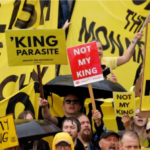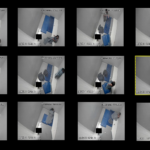Police have taken to the streets to fingerprint people on demand, it has been revealed.
Last week, the Metropolitan police became the 25th force in the country to confirm that mobile fingerprinting scanners will be used by officers on the beat.
Initially the Met have 350 of these devices, linked to police Blackberry phones, which they claim can provide, in minutes, confirmation of personal details, warning markers and whether a person is wanted for a crime.
The police have been given powers to take a person’s fingerprints if they “reasonably suspect” that someone has committed a crime.
The person concerned does not need to be under arrest, and the offence does not need to be a major offence.
Once the fingerprints have been taken, police may decide to issue a summons, give “words of advice”, or a fixed penalty notice, or arrest the individual.
The police claim that this will help to save money, save police time, and provide an alternative to arrests.
But, given the history of ‘function creep’ in police powers, the use of portable biometrics testing could pose a serious threat to civil rights and used to target black and asian groups, immigrants, protesters and other such communities.
In fact, these new scanners could be a way of introducing the principles behind the biometric ID cards by the back door.
A guide published by Netpol urged people not to comply with these fingerprinting requests, unless there is a very good reason to do otherwise.
Their guides outlined the rights people have under the law. We have reproduced it below.
Your rights and mobile fingerprinting
When can police take fingerprints with a mobile device?
-
If you are under arrest and you are taken to a police station, the police have the power to take your fingerprints (by force if necessary).
-
The police can take fingerprints away from a police station ONLY if they have reason to suspect you have committed an offence AND they have reason to doubt that you have provided your real name and address.
-
If the police have grounds to take fingerprints, they must first give you an opportunity to give your details. They can fingerprint you only if there are ‘reasonable grounds’ to doubt you have given your real name and address.
-
If you have provided a document showing your name and address, they must tell you why this is not sufficient on its own to prove your identity.
-
If you refuse to give your fingerprints (and the police have ‘reasonable suspicion’), they have the power to take fingerprints without consent, or to arrest you for the offence you are suspected of, and take you to the police station.
What if I haven’t committed an offence?
-
To lawfully take your fingerprints the police must suspect that you have committed an offence. They MUST tell you what offence you are reasonably suspected of having committed and why you are reasonably suspected of committing it. If the police will not or cannot do this, you SHOULD NOT provide your fingerprints (or your name and address).
-
If the police allege that you have committed an offence, MAKE SURE they explain what offence it is that has been committed, and what reason they have for suspecting you.
-
Being stopped and searched, DOES NOT by itself give the police powers to take your fingerprints OR your name and address.
-
Being detained to prevent a breach of the peace, or held in a protest kettle, DOES NOT by itself give the police powers to take your fingerprints OR your name and address.
-
If the police have suspicion that you are breaching bail conditions, they have the power to arrest you. A suspicion that you are breaching bail conditions DOES NOT give them the power to take your fingerprints on a mobile scanner, as this is NOT an offence.
What if I am suspected of Anti-social behaviour?
-
If the police allege that you have engaged in anti-social behaviour*,INSIST they tell you what they ‘reasonably believe’ you have done that was likely to caused harassment, alarm and distress.**
-
If the police cannot or will not tell you why they believe you were likely to cause harassment alarm or distress, , the police do NOT have powers to take your fingerprints, and you SHOULD NOT give a name and address.
-
If the police DO you have reason to believe you have engaged in anti-social behaviour, they DO have the power to demand your name and address. The police WILL then have the power take your fingerprints IF you refuse to provide your name and address, OR they suspect you of providing a false name and address***.
* Anti-social behaviour is any behaviour likely to cause harassment alarm or distress to a member of the public. If what you did was not likely to do that, it was not anti-social behaviour. Non-violent protest is NOT anti-social behaviour, even if it is unlawful.
** Swearing in front of a police officer probably ISNT anti-social behaviour as the law says that police officers are unlikely to be caused ‘harassment alarm or distress’ by bad language. (This may not be the case if other people could hear.)
***Under s50 Police Reform Act, you commit an offence if you do not provide your name and address when a police officer reasonably believes you have engaged in anti-social behaviour.
What happens if I give my fingerprints?
-
The device will scan your fingerprints and check them against the police database. They should return a result within two minutes. The scan taken by the mobile fingerprint device is NOT kept, and DOES NOT stay on the system.
-
If your prints are already on record, the police will be able to see your details. These will include your name, last known address, warning markers and whether or not you are wanted for any outstanding offences.
-
If the offence you are suspected of committing is a minor one, and you have given your prints, the police SHOULD consider alternatives to arrest eg summons, fixed penalty notice or words of advice.
-
If your prints are not already on the database, this will mean that the police cannot verify your details. What the police do then is up to them – depending on the situation they may accept the details you have given as true, or they may arrest you for the offence you are suspected of committing. If you are arrested your prints will be taken in the police station, and these will be retained on the system.



















Follow Us!